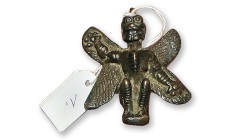Emiline Smith speaking at University of Hong Kong, 24 March
17 Mar 2015

Emiline Smith will present ‘Cross-Border Cultural Property Trade in Hong Kong’ at the University of Hong Kong from 1–2 pm on 24 March.
Smith’s talk will be in Rm 929, The Jockey Club Tower, Centennial Campus, at HKU
All are welcome to attend.
Cross-Border Cultural Property Trade in Hong Kong
By: Emiline C.H. Smith, University of Glasgow
Chinese legislation regarding cultural property ascertains State ownership of almost all such objects within national borders, and the regulation of trade, import and export of privately owned objects. Hong Kong on the other hand does not provide clear legislation or policy on state/private ownership, trade, export and import of cultural property. This talk will explore the ‘spaces between the laws’ of both countries and the influence this has on contemporary protection of cultural property. The term ‘cultural property’ refers to objects of scientific, historic, religious, cultural and aesthetic value, including works of art, archaeological sites and artefacts (antiquities), historical buildings, religious sites, and museums. They are extremely rare, non-renewable, and vulnerable to man-made or natural threats. This talk will be based on PhD fieldwork in Hong Kong, China and Singapore, and will focus on the trade of cultural property through Hong Kong. Historically, the border between China and Hong Kong has been prone to a variety of cross-border criminal activities because of the dichotomies between the two nations’ legal systems. Cultural property is one of the commodities known to often be smuggled from mainland China into Hong Kong. Chinese antiquities in particular are in popular demand with Chinese buyers as well as buyers abroad. Through interviews with various actors involve in the trade, as well as documentary research, the PhD project from which this talk stems will analyse the structure of the cultural property trade in transitional portals from a socio-criminological perspective, clarifying what circumstances contribute to the functioning of these portals as such. The assessment of the functioning of transition portals within the global cultural property trade can aid future attempts to curb the illicit trade.
